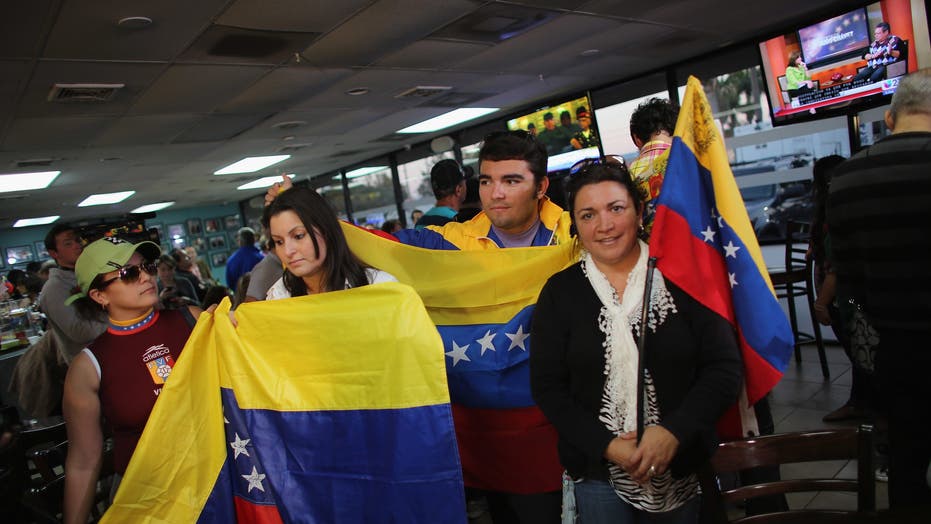From the streets of Caracas to popular restaurants in Doral, Fla., Venezuelans reacted with cautious optimism and some sorrow following news that their populist president had died.
News broke of Chávez’s death on Tuesday evening, as people left work in Caracas and Venezuelans began heading home. While many Venezuelans said they were shocked by the news, the politically tense Venezuelan capital remained nominally peaceful, said Alejandro Grisanti, a member of the Venezuelan-American Association, a non-profit business organization in New York City.
“Everyone so far has remained very respectful, people are for the most part just heading home,” Grisanti, who is also the head of Latin American Research at Barclays bank, said from Caracas. “Many people were expecting this with Chávez being out of the public eye for three months.”
Grisanti added that after a period of mourning, the country will hold elections and the democratic process in Venezuela will resume.
“People should remain calm and let the political process run its course,” Grisanti said. “I expect a more modest government either way.”
Carlos Ramirez Lopez, 67, a Venezuelan lawyer who had lived in exile in Miami for two years, said he hopes that conditions and democracy return to his homeland.
“I would love to be able to go back to my country,” said Lopez, who said he was persecuted in Venezuela because he criticized the government.
Lopez worries that chaos will erupt now because there will be a power vacuum.
“Chávez was a leader who could dominate difficult situations,” he said. “He had a following, he had military devotees. Maduro lacks the mandate, and the charisma. I certainly did not like Chávez, but you have to acknowledge that he was a leader with a following.”
Lopez said he worries that Maduro is trying to cement power by launching a campaign of terror, warning that the world is out to destabilize Venezuela.
After learning of their president's death, hundreds of anguished Venezuelans poured onto the streets of downtown Caracas crying, hugging each other and shouting slogans supporting Chávez.
Clusters of women with tears streaming down their faces clung to each other and wept near the Miraflores presidential palace. Some wore T-shirts with reading, "Go forward commander!"
"I feel such big pain I can't even speak," said Yamilina Barrios, a 39-year-old office worker weeping at a street corner. "He was the best thing the country had ... I adore him. Let's hope the country calms down and we can continue the tasks he left us."
One of Chavez’s daughters, Maria Gabriela, tweeted in Spanish: “I have no words. Thank you, forever. Courage! We should follow his example. We should continue building our nation. So long, Daddy!”
In the Miami suburb of Doral, Venezuelans watched on television as the country's vice president, Nicolas Maduro, announced Chávez had died Tuesday. Doral has the largest concentration of Venezuelans in the United States.
Doral's mayor and police chief prepared a security and contingency plan in the event of Chavez's death.
There are nearly 190,000 Venezuelans in the United States, most in Miami. Many are strongly anti-Chavez.
At El Arepazo 2, a popular restaurant in Doral, dozens of Venezuelans draped in flags celebrated the news, expressing hope for their country’s future.
“What everyone is celebrating is the possibility of a return to Democracy in Venezuela,” said Pedro Vásquez, 36. “Now there is a responsibility to really pressure the government to have free elections.”
But Xiomara Savino, 55, who was visiting Miami from Venezuela, said she was not happy with the news – mostly because she wanted Chavez to serve justice.
“I wanted to see him pay for all the damage he did to the people of Venezuela,” Savino said. “His death was an easy way for him to go.”
In New Jersey, Monica Bustamante, who left Venezuela 18 years ago, has misgivings about her homeland’s future.
“I hope that things can change for the better,” said Bustamante, who travels home frequently and last visited last year. “But the people in power are determined to stay in power, they’ve made that clear. I’m sure they will make sure Maduro wins.”
Bustamante, 42, said she has tried to get a hold of her relatives in Venezuela, but has been unsuccessful.
“I hear from my friends and relatives on social media that there is a lot of tension in Venezuela,” said Bustamente, who is a day care teacher. “Some people are celebrating, others are mourning. But that’s the kind of civil strife Chavez bred in Venezuela.”
Vanessa Rodriguez of the Fox News Miami Bureau and The Associated Press contributed to this report.
Follow us on twitter.com/foxnewslatino
Like us at facebook.com/foxnewslatino

